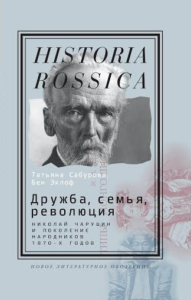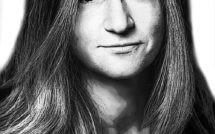
Friendship, Family, Revolution: Nikolai Charushin and a Generation of Populists of the 1870s by Ben Eklof and Tatiana Saburova
 This is part of our special feature, Diversity, Security, Mobility: Challenges for Eastern Europe.
This is part of our special feature, Diversity, Security, Mobility: Challenges for Eastern Europe.
This work consists of ten chapters arranged in a chronological order, and covers more than a century of Russian history. The authors of the book, Tatyana Saburova and Ben Eklof have been successfully studying various aspects of one of the most interesting and difficult to understand periods of Russian history for a long time. In their new book, the Russian and American historians are making an effort to understand the paradoxes of Russian history based on Nikolai Charushin’s life.
The choice of Charushin as the main focus is a successful one. Nikolai Charushin does not rank among the pantheon of famous historical figures, but this has its positive side. Charushin’s story demonstrates that the revolutionary movement in the last decades of the nineteenth century recruited new members not only from the educated strata of St. Petersburg or Moscow, but from the Russian periphery as well. This allows the reader to be able to learn a lot about the life of a provincial Russian town, of prison and exile, and about the relationship between the authorities and the revolutionaries in the periphery.
Through Charushin’s biography, Saburova and Eklof managed to describe a whole era in Russian history and a generation of revolutionaries. They seek to explain the role that different circumstances, individual characteristics, and social environment played in determining the life strategy of the revolutionaries of the 1870s. This book convinces us that there are no simple answers to such complex questions.
Nikolai Charushin was born in the small town of Orlov in the Vyatka province in 1851. The population of the town, situated on the Vyatka River, was no more than three thousand people. However, there were several schools, a good library, and People’s club in the town. Little Nikolai spent his childhood very much like Tom Sawyer, playing games with other children in the open air. Charushin’s father resigned from the civil service with the rank of a court chancellor. It was the seventh rank out of fourteen, according to the Table of Ranks, which codified the hierarchy of the tsarist civil service. He had little influence on his eight children. Charushin’s mother was a very religious woman, but not well versed in Scripture. She could hardly explain to her son the essence of Christian teaching. There were only two or three books in the Charushins’ household. As a child, Nikolai read little and studied badly at school. Charushin didn’t experience social injustice or poverty, although after his father’s death, the family needed money. So, it’s hard to rely on his childhood to explain why Nikolai Charushin became interested in public issues when he was studying in the Vyatka (city) gymnasium.
In Vyatka (the provincial seat), he met Anna Kuvshinskaya who shared his interests, and later became his wife. As young adults they moved to St.Petersburg where, instead of studying at the university, they both joined an illegal revolutionary organization known as populists. Populists had great sympathy for the suffering peasant masses. They believed that Russia would bypass the capitalist stage of development and saw in the peasant commune the germ of the future socialist society. There were a few organizations of that stripe in Russia. One group of populists believed that the state would not change of its own accord. They were trying to undermine the autocratic power of the tsar through terrorist acts. (Lenin’s brother Aleksandr Ulyanov was a member of this group and was executed for a failed attempt on the Tsar’s life). Another group, to which Charushin belonged, believed that society could be changed through propagandistic work among the working people. Through Charushin’s biography, looking at the choices he made and the events he participated in, Saburova and Eklof try to take a fresh look at some pivotal events in Russian history.
The historical biography genre allows the historians the opportunity to overcome the tendency to depersonalize history, turning it into a social processes, and sets of a statistical data. The book reveals the realities of life in provincial Russia to the readers and helps them to understand the realities facing the provincial intellectuals and how these realities informed the choices they made.
Charushin’s life spanned two major political upheavals in Russian history, the reforms of Alexander II and the Bolshevik revolution. After a disastrous defeat in the Crimean War, the Russian Emperor Alexander II (1855-1881) embarked on the modernization of the country. In 1881, the tsar-reformer became a victim of terrorists convinced that regicide would lead to the destruction of the entire old regime. To understand this course of events we should cast our look back, at least to the beginning of the eighteenth century, when Peter the Great was on the throne. The most prominent Russian tsar wanted his country to become an influential force in Europe, but his program of modernization didn’t include any limitation on autocratic power or the abolition of serfdom.
During the century after Peter’s death, Russia strengthened it’s military power, laid a firm foundation of science, technology, and also produced a specific Russian phenomena called “inteligensia.” Since the end of the eighteenth century, educated Russians, culturally oriented to Western Europe, became more and more critical of Russia’s political and social order. Many of them understood that, due to Peter’s reforms, Russia had become Westernized in only some aspects. Most of Russia’s achievements in domestic and foreign policies rested on the external coercion of state power and merciless exploitation of common people, most of which were serfs.
The process of modernization split Russia in many aspects. One influential group of Russian intellectuals, so called “Westernizers,” believed that Russia should develop in a western way taking into account national specific. The other group “Slavophiles” insisted on the uniqueness of their country but were agree to take Western experience compatible with Russian special path. In course of these heated debate, the idea of Russian socialism was born.
In 1853, Tsar Nicholas I, convinced of the superiority of his army, provoked a war with the Ottoman Empire. The humiliating defeat in 1855 not only exposed Russia’s military and economic weakness compared to developed European nations, but had also put under question the nationalistic myths and religious ideas that guided Nicholaevan Russia. Nicolas’s successor to the throne Alexander II, had no other option but to start a new round of reforms with the aim of modernization the country.
At first, society hailed the Tsar as a liberator for abolishing serfdom. Alexander also reformed education, local government, judicial system, army and other social institutions. Due to his active foreign policy, he restored Russia’s status as a Great Power. But very soon people had become disappointed with the contradictory effects of social changes. And again, Russian society split in relation to the reforms. Conservatives were indignant at Alexander’s reforms in principle, liberals thought them to be too moderate, while revolutionaries believed that reforms in themselves demonstrate weakness of power. All these discussions about reforms affected a relatively small part of Russian society, the bulk of which was still the illiterate and silent peasantry. This is the situation in which Charushin lived and engaged in populist activities among the masses with the goal of creating a better Russia.
Tatyana Saburova and Ben Eklof tried to reproduce as accurately as possible all the facts of Charushin’s biography, which demonstrate his beliefs, moral values, and ideals. They’re trying to identify the reasons for making the decisions, which guided Charushin in the most important moments of his life. Given his background, Charushin had the opportunity to get a higher education, a well-paid job and live the life of an ordinary civil servant. But he chose a revolutionary path, drawn by an idealistic rather than a terroristic vein of populism. Without any doubt, Charushin was a man of strong character. Having joined the revolutionary organization, Charushin knew perfectly well what kind of future awaited him in case of arrest. When he was sentenced to long years of prison, hard labor and exile to Siberia for distributing revolutionary propaganda among the workers of St. Petersburg, Charushin didn’t betray his comrades, he didn’t write a petition for pardon when serving a sentence, and he never tried to improve his position at the expense of others. Instead, he remained faithful to his comrades and his beliefs.
Upon return from exile, he took up positions as a member of local self-govenment (zemstvo) in Vyatka and the editor of a local newspaper, where waged a battle against the injustice and arbitrariness of any power through the power of the press and local governmental organizations. Upon the Bolshevik rise to power, Charushin became an outcast once again, as Populist, Social Revolutionary and Menshvik were deemed to conciliatory to be effective and possible rivals for power who needed to be eliminated.
In the decades following the 1917 Revolution, Charushin wrote his memoirs to protect his deceased populist comrades from the Bolsheviks’ slander as a failed and ultimately impotent branch of the revolutionary tradition. It is these memoirs, which are the backbone of this book, though Saburova and Eklof examined a large number of scholarly publications and primary sources. The analysis of the revolutionaries V. Figner, L.Deich. P.Kropotkin and L.Tikomirov’s memoirs is of particular interest.
Along with the merits, the publication has some drawbacks. To evaluate historical research one should compare the tasks put by the author with the results obtained. Using this criterion, we can see that Saburova and Eklof managed to reconstruct Charushin’s biography but failed to explain the motives for his behavior. There could hardly be more done. History has its limits. Any historical fact can be interpreted in many ways. Biographical facts describe the behavior of the person, but do not explain his actions. For example, the authors of the book tried but failed to explain why Charushin became a revolutionary or why he was so adherent to his views. On the other hand, the book provides the reader with rich information from which they can make their own judgments about the life path of this unusual man. The weakest point of the study is the conclusions. The final part of the work looks more like a brief summary of the previous chapters than the list of obtained findings.
In their attempt to explain the populists’ ideology, Saburova and Eklof come close to describing it as a religious experience, but do it outside the established historical context. They do not demonstrate an understanding of the revolutionary movement in Russia as a reaction to the crisis of Orthodoxy. The essence of Christianity had never been fully understood by many Russians. Ritual became far more important than scripture or doctrine for millions of Orthodox Christians, who performed rites, believing that this way they were serving Christ. The Orthodox Church persuaded believers that obeying the Tsar, the subjects fulfill their religious duty, though Russian tsars were far from being an example for Christians to follow. By the middle of the XIXth century, this policy produced overall disappointment both in Church and the State.
At that time, the Populists tried to design their own ideal, which consisted of fragments of Christianity, philosophical theories and illusions. The Populists’ vision of the future was very vague, but they were ready to sacrifice themselves for the sake of its triumph. The monograph contains all the necessary material for such conclusions, but the authors of the study for some reason do not make them.
The authors’ assertion that the Populists were united as a generation by the factor of “ethical rationalism” seems a controversial one. The notion “ethical rationalism” in itself contains a logical contradiction. In critical situations human beings act morally by obeying the voice of conscience, not of reason. In every chapter of the book one can find a lot of evidence of Populists’ irrationality. Not having finished their education, young people felt themselves ready to teach others. Striving for freedom, they went to prison. There are many contradictions in the Populist’s thoughts and actions. Charushin himself presents a vivid example of that. Nikolai Charushin brought the greatest benefit to the people, not as a revolutionary but as a publisher, newspaper editor, photographer and librarian. For example, after the Bolsheviks came to power, Charushin managed to protect the book collection of the Vyatka Public Library, one of the best in Russia, from destruction.
The book gives us relatively little new information about private life of revolutionaries, with the exception that in family relationships, they behaved like ordinary people. They married and divorced, worried about the future of their children, suffered in case of illness or death of their loved ones. This serves to personalize their history but does not add any new discursive dimension.
Some critical remarks should be made about the language of the book. The authors often abuse the word “discourse,” which has no analogue in Russian. In some cases, it causes difficulties in understanding the meaning of the sentence. Additionally, the residents of Vyatka should be called “vyatchane” instead of “vyatichi.” Vyatiche were an ancient Slavic tribe.
In general, the book is well written and will interest different categories of readers. The plot, which humanizes the daily struggles of the populists in general, and in particular Charushin, will captivate some. Others will learn many new facts about nineteenth century Russian revolutionary traditions, its shallow roots and its forms outside of the large, well-researched, cities. And all readers will appreciate the fruitful cooperation of Russian and American historians.
Reviewed by Aleksandr Iakovlevich Gudov, Viatka State University
Дружба, семья, революция: Николай Чарушин и поколение народников 1870-х годов
by Ben Eklof and Tatiana Saburova
Publisher: Новое литературное обозрение
Hardcover / 448 pages / 2016
To read more book reviews, please click here.
Published on December 6, 2017.




